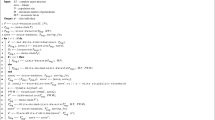Abstract
Search and score techniques have been widely applied to the problem of learning Bayesian Networks (BNs) from data. Many implementations focus on finding an ordering of variables from which edges can be inferred. Although varying across data, most search spaces for such tasks exhibit many optima and plateaus. Such characteristics represent a trap for population-based algorithms as the diversity decreases and the search converges prematurely. In this paper, we study the impact of a distance mutation operator and propose a novel method using a population of agents that mutate their solutions according to their respective positions in the population. Experiments on a set of benchmark BNs confirm that diversity is maintained throughout the search. The proposed technique shows improvement on most of the datasets by obtaining BNs of similar of higher quality than those obtained by Genetic Algorithm methods.
Access this chapter
Tax calculation will be finalised at checkout
Purchases are for personal use only
Preview
Unable to display preview. Download preview PDF.
Similar content being viewed by others
References
Kabli, R., Herrmann, F., McCall, J.: A chain-model genetic algorithm for bayesian network structure learning. In: Proc. of the 9th Conference on Genetic and Evolutionary Computation, pp. 1271–1278 (2007)
Regnier-Coudert, O., McCall, J.: An island model genetic algorithm for bayesian network structure learning. In: Proce. of the IEEE CEC 2012 (2012)
Wu, Y., McCall, J., Corne, D.: Two novel ant colony optimization approaches for bayesian network structure learning. In: Proce. of the IEEE CEC 2010, pp. 4473–4479 (2010)
Cowie, J., Oteniya, L., Coles, R.: Particle swarm optimization for learning bayesian networks. In: Proc. of World Congress on Engineering, pp. 2–4 (2007)
Larranaga, P., Kuijpers, C., Murga, R., Yurramendi, Y.: Learning bayesian network structures by searching for the best ordering with genetic algorithms. IEEE Transactions on Systems, Man and Cybernetics 26(4), 487–493 (1996)
Cooper, G., Herskovits, E.: A bayesian method for the induction of probabilistic networks from data. Mach. Learn. 9(4), 309–347 (1992)
Heckerman, D., Geiger, D., Chickering, D.: Learning bayesian networks: the combination of knowledge and statistical data. Mach. Learn. 20(3), 197–243 (1995)
dos Santos, E., Hruschka, E., Ebecken, N.: A distance-based mutation operator for learning bayesian network structures using evolutionary algorithms. In: Proc. of the IEEE Congress on Evolutionary Computation, pp. 1–8 (2010)
Thierens, D.: Adaptive mutation rate control schemes in genetic algorithms. In: Proc. of the IEEE CEC, pp. 980–985 (2002)
Kirkpatrick, S., Gelatt Jr., C.D., Vecchi, M.P.: Optimization by simulated annealing. Science 220(4598), 671–680 (1983)
Lauritzen, S., Spiegelhalter, D.: Local computations with probabilities on graphical structures and their application to expert systems. Journal of the Royal Statistical Society, 157–224 (1988)
Genie and smile, http://genie.sis.pitt.edu/ (accessed: March 30, 2012)
Norsys, http://www.norsys.com (accessed: March 30, 2012)
Boerlage, B.: Link strength in bayesian networks. Master’s thesis, University of British Columbia (1992)
de Jongh, M., Druzdzel, M.: A comparison of structural distance measures for causal bayesian network models. In: Recent Advances in Intelligent Information Systems, pp. 443–456 (2009)
Author information
Authors and Affiliations
Editor information
Editors and Affiliations
Rights and permissions
Copyright information
© 2012 Springer-Verlag Berlin Heidelberg
About this paper
Cite this paper
Regnier-Coudert, O., McCall, J. (2012). Competing Mutating Agents for Bayesian Network Structure Learning. In: Coello, C.A.C., Cutello, V., Deb, K., Forrest, S., Nicosia, G., Pavone, M. (eds) Parallel Problem Solving from Nature - PPSN XII. PPSN 2012. Lecture Notes in Computer Science, vol 7491. Springer, Berlin, Heidelberg. https://doi.org/10.1007/978-3-642-32937-1_22
Download citation
DOI: https://doi.org/10.1007/978-3-642-32937-1_22
Publisher Name: Springer, Berlin, Heidelberg
Print ISBN: 978-3-642-32936-4
Online ISBN: 978-3-642-32937-1
eBook Packages: Computer ScienceComputer Science (R0)




